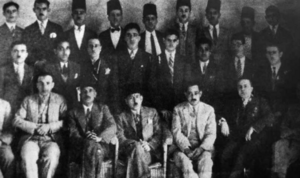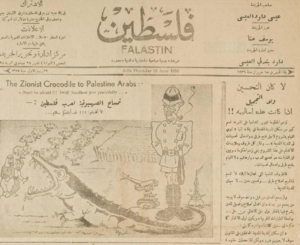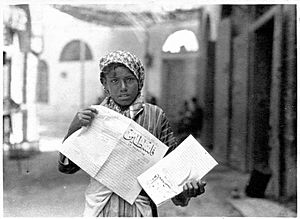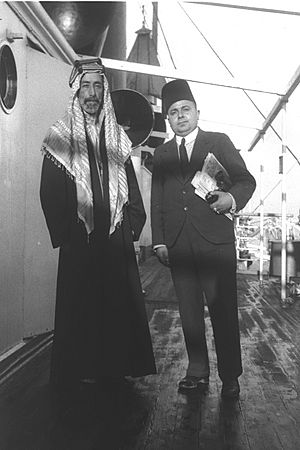Falastin facts for kids
 |
|
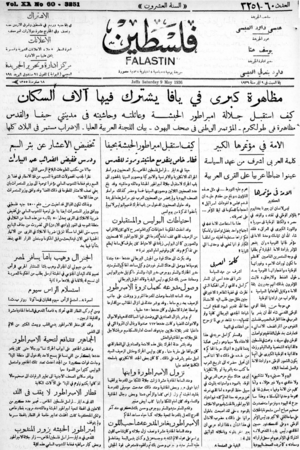
Cover of Falastin (9 May 1936), with the headline story reporting on the Arab revolt in Palestine
|
|
| Type | Daily newspaper |
|---|---|
| Format | Broadsheet |
| Founder(s) | Issa El-Issa |
| Founded | 15 January 1911 |
| Political alignment | Anti-Zionism Palestinian nationalism |
| Language | Arabic English |
| Ceased publication | 8 February 1967 |
| City | Jaffa East Jerusalem |
| Country | Ottoman Empire Mandatory Palestine Jordanian West Bank |
| Circulation | 3,000 (as of 1929) |
Falastin (Arabic: فلسطين), which means Palestine in Arabic, was a very important newspaper in Palestine. It was written in Arabic. It started in 1911 in Jaffa as a weekly newspaper. Later, it became one of the most important daily newspapers in the region. This was during the time when the Ottoman Empire and later British rule were in charge.
Falastin was the most famous newspaper in Palestine. In 1929, when it became a daily, about 3,000 copies were printed each day. This might seem like a small number today, but it was almost twice as many as its closest rival. However, another newspaper called Al Difa' started in Jaffa in 1934 and soon became even more popular. Both newspapers improved steadily, and their competition was a big part of public life in Palestine until 1948.
The newspaper was started by Issa El-Issa. His cousin, Yousef El-Issa, also joined him. Both were Arab Christians. They were against Zionism and the British government in Palestine. At first, the newspaper focused on helping Arab Christians gain more control over the Greek Orthodox Church in Jerusalem. This movement was called the Arab Orthodox Movement. Falastin's founders led this movement. The newspaper was also the strongest critic of Zionism, saying it was a danger to the Arab people of Palestine. It helped shape what it meant to be Palestinian. Because of its strong opinions, the newspaper was shut down many times by the Ottoman and British authorities, often due to complaints from Zionists.
During the 1948 Arab–Israeli War, Falastin had to leave Jaffa. It moved to East Jerusalem in the West Bank, which was then controlled by Jordan. The newspaper continued to be published until 1967. Then, it joined with another newspaper called Al-Manar to create Ad-Dustour in Amman, Jordan. This newspaper is still published today.
Contents
History of Falastin
Falastin was started on January 14, 1911. It was founded by Issa El-Issa and Yousef El-Issa. They were cousins and Palestinian Arab Christians from Jaffa. This newspaper was one of the few that appeared after the Young Turk Revolution in 1908. This revolution ended strict rules about what could be printed.
At first, the newspaper focused on the Orthodox Renaissance. This was a movement to give Arab Christians more control over the Greek Orthodox Church in Jerusalem. The goal was to use the church's money to improve education for Arab Christians in Palestine. The newspaper also wrote about making society more modern, making changes, and helping farmers.
Zionism was another very important topic. The editors were worried about the future of the farmers. In its first year, Falastin published only a few articles about Zionism each month. But soon, it published one or more articles about it in almost every issue. Other newspapers in the region started to rely on Falastin for news about Zionist settlement in Palestine.
The newspaper first focused on news from the Mutassarifate of Jerusalem. This included news from Jaffa and Jerusalem, and sometimes from Hebron, Jericho, and Gaza. By 1913, it covered all of Palestine. The editors even sent a copy of each issue to every village in the Jaffa area.
Issa El-Issa studied at the American University of Beirut. He worked in several places before starting Falastin. His family was known for being smart and involved in politics and writing. They were financially independent because they had invested in olive oil and soap businesses. Issa's cousin, Hanna El-Issa, was an editor for a short-lived magazine called Al-Asma'i. It was first published in Jerusalem in 1908. Not much is known about Hanna's brother, Yousef. He was Falastin's main editor between 1911 and 1914.
During World War I, both Issa and Yousef were sent away to Anatolia. After the Arab Kingdom of Syria was created in 1920, Issa became the head of King Faisal's royal court. When the French defeated the Kingdom that same year, Issa returned to Jaffa. He was allowed to publish Falastin again in 1921. Issa's son, Raja El-Issa, took over publishing the newspaper after 1938.
Why Falastin Was Stopped
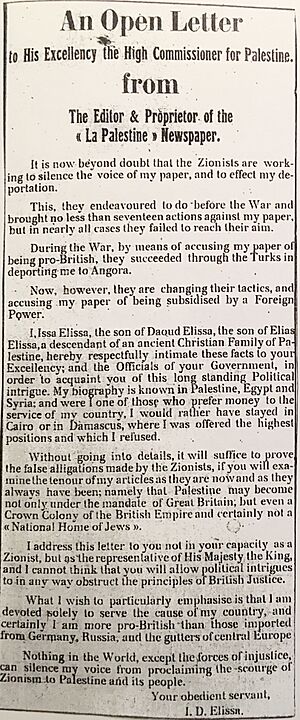
Falastin had to deal with strict rules about what it could print. These rules came from the Ottoman Empire and later the British. The newspaper was stopped from publishing more than 20 times. In 1914, the Ottoman authorities stopped Falastin. One reason was for criticizing a local governor. Another time, it was stopped for saying that when people realized the danger they were in, they would rise up against Zionists.
After the first time it was stopped in 1914, Falastin explained that "Zionist" was not the same as "Jew." It described Zionists as a "political party" that wanted to take Palestine for their own nation. The newspaper was supported by important Muslim and Christian leaders. A judge even said the newspaper could publish again. He believed in freedom of the press.
When the newspaper was allowed to publish again, Issa El-Issa wrote that Zionists still saw his newspaper as a big problem. He said it stopped them from reaching their goals and told people about their plans. In court, he explained that when he said "Zionists," he meant the political group in Europe that wanted to colonize Palestine and make it a Jewish homeland. He said he had a good view of Jewish people, calling them "brothers." The court agreed with Issa and Yousef. Another newspaper, Al-Karmil, reported that crowds cheered after the decision. The French Consulate said that happy crowds carried the editors on their shoulders after the trial.
Sports News in Falastin
The start of Falastin newspaper in 1911 was a key moment for sports reporting in Ottoman Palestine. It was one of the most active newspapers and also reported on sports events. Falastin covered sports news, which helped create a modern Palestinian identity. It brought villages and cities together and helped strengthen Palestinian national feelings.
Important People and Falastin
Yousef El-Issa, who was the main editor of the newspaper when it first started, is seen as a "founder of modern journalism in Palestine." Al Muqattam, a widely read newspaper in Egypt, wrote about Yousef when he was editor (1911-1914):
Leaders of Arabs in all major cities pay close attention to the writings of Ustad Yousef El-Issa.
Albert Einstein's Letter
On January 28, 1930, Albert Einstein sent a letter to Falastin's editor, Issa El-Issa.
- Einstein believed that people from different nations should live together peacefully. He thought that the future of Palestine depended on Arabs and Jews working together. He hoped that the Arab people would understand why Jews wanted to build a national home in their ancient land. He believed that if they worked together, more Jewish people could settle there. Einstein was sure that the Jewish people's dedication to Palestine would help everyone in the country, not just with money, but also with culture and national pride. He felt that the Arab world would benefit from Jewish support. He wanted there to be open and honest talks about these ideas. He thought that Arabs and Jews, who had both given so much to Western civilization, could have a great future together. Instead of fighting, they should support each other's national and cultural efforts. He believed that people not directly involved in politics should help create an atmosphere of trust.
- Einstein was sad about the terrible events of August 1929. He felt they showed the worst of human nature and made it harder for the two groups to get along. But he believed they must come together eventually.
Falastin's Centennial Conference
A conference called "Falastin's Centennial" took place in Amman, Jordan, in 2011. This event celebrated 100 years since the newspaper started. Twenty-four researchers and experts from different places came together. They looked at how Falastin helped shape the Middle East in the 20th century. The conference was organized by the Columbia University Middle East Research Centre.
The conference also showed the strong connection between Jordanian culture and Palestine. Many articles in Falastin featured Jordanian cities and news. The newspaper's founder, Issa El-Issa, was a close friend of the Hashemite royal family. Falastin covered news about the Hashemites, from Sharif Hussein to his sons King Faisal I and King Abdullah I, and his grandson King Talal. The newspaper recorded King Abdullah's relationships with Palestinian leaders and people. It documented every trip he made to a Palestinian town and every time he supported Palestine against Zionism. Reporters for the newspaper in Jordan even interviewed the King at Raghadan Palace.
One person at the conference said:
Many people think it's just a newspaper, but it's actually a treasure chest of information and documents about the history of the Arab world.
Images for kids
-
Falastin's headquarters in Jerusalem, 1950s.
See also
- El-Issa Family
 | Selma Burke |
 | Pauline Powell Burns |
 | Frederick J. Brown |
 | Robert Blackburn |


